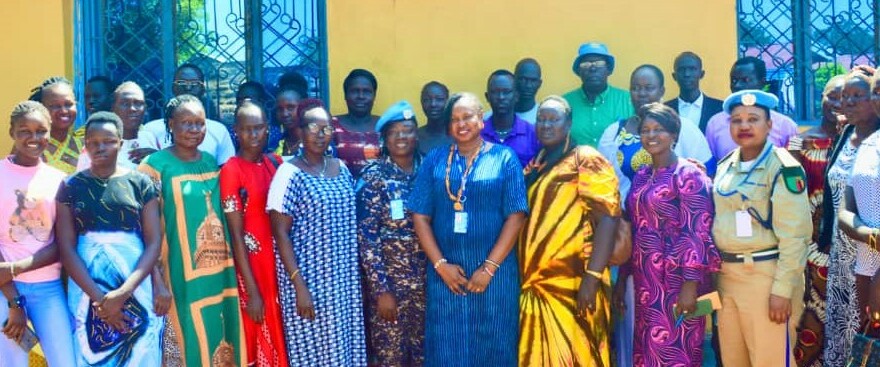Women in Lakes State, South Sudan, concluded a 3-day women’s leadership engagement workshop organized by the United Nations Mission in South Sudan (UNMISS). During the event on Friday, participants, consisting of 41 females and 9 males, called for the inclusion of women’s political rights in the national constitution-making process.
Honourable Mariam Philip, an MP and women’s representative for Yirol West county in the Lakes State legislative assembly, emphasized the importance of encouraging women’s active involvement in leadership roles. She expressed the need for unity among women, regardless of their political affiliations, stating, “We should stand together as women, sharing ideas and promoting women’s participation in politics.”
Philip highlighted that women, being the majority, should collaborate to bring about positive change and development in Lakes State. Emphasizing unity, she urged women to focus on shared goals rather than political differences.
Ding Mario, the Minister of Gender, stressed the significance of hosting workshops on gender, where women and youths can discuss their rights. Mario emphasized that such forums play a crucial role in enhancing women’s participation and disseminating information within the community.
“We express our gratitude to UNMISS, CEPO, and other NGOs for their support in organizing this workshop at Serena Hotel in Rumbek,” she stated.
Alek Malaak Atem, the gender advisor, highlighted the significant impact of the workshop on women in Lakes State. She mentioned that the recommendations from the workshop have been submitted to the head office for implementation. Atem emphasized the need for active planning and execution by the women themselves to reach remote areas and raise awareness about women’s rights and the constitution.
“We must understand what the constitution says about women’s rights, especially the stipulated 35%. To achieve this percentage for the women of Lakes State, we need to ensure that women at the grassroots level are informed to support women’s leadership,” she explained.
Atem stressed the importance of self-support among women to reach the targeted 35%. She acknowledged the role of partners in building the capacity of female leaders in Lakes State and university students, paving the way for future generations.
Agum Joseph Kuc, the women’s chairperson of Lakes State, announced the conclusion of the gender and women engagement workshop organized by UNMISS at Serena Hotel in Rumbek. She highlighted the opportunity the forum provided to discuss social, economic, and political issues affecting women in Lakes State.
Kuc addressed challenges faced by women in politics, including late arrivals and late-night meetings that hinder full participation. She urged participants to allow young women to speak early in meetings and emphasized the role of elderly women in creating awareness in the community.
Adama, the UNMISS gender officer in Lakes State, explained that the workshop focused on women active in politics due to the upcoming election and constitution-making process. She highlighted the importance of including both men and women in the discussion, even though the primary focus was on women, to ensure that the messages reach a wider audience.
She expressed, “The engagement was highly beneficial and incredibly participatory. The participants were actively involved, and the comments from the floor were mature and thoughtful. Over the successful three days, a key recommendation emerged: women are earnestly working to contribute their voices to the development of South Sudan. This is crucial for our country’s progress.”
Emphasizing the importance of inclusivity, she stated, “Development requires the perspectives of both men and women. This workshop aimed to facilitate that inclusivity. One of the key recommendations is that women’s voices should play a role in the constitution-making process to ensure that their visions are incorporated.”
Furthermore, she highlighted the often-overlooked group of disabled people, stating, “Another group that is frequently excluded is the disabled community. The recommendation is clear: the consultation for the constitution-making process should include the disabled, addressing their special needs. Additionally, on the issue of inheritance, women often face challenges. The recommendation is to incorporate measures into the law that empower women to advocate for inclusiveness in matters of land and marriage inheritance.”
Yolanda Kuei Paul Macuei, a participant in the three-day workshop, shared insights, saying, “The workshop focused on women’s engagement in leadership, politics, and the constitutional-making process. Over the course of three days, we discussed various topics, including women’s participation in leadership, key roles in politics, involvement in political parties, and women as the voice of change, holding significant positions both within Lakes State and beyond.”
She remarked, “Through our discussions, we’ve gained valuable insights. We’ve resolved that women need comprehensive training on leadership, empowering them to express their opinions without fear. They should be encouraged to access resources and engage in activities traditionally dominated by men, as long as they possess the necessary skills. Collaboration with both youth and men is crucial for the nation’s progress.”
“We are actively involving women in the upcoming electoral processes in South Sudan. The training has empowered them, and they are eager to participate. We hope to extend this training to grassroots women, enabling them to understand their rights, believe in themselves, and contribute to positive change in the country,” she stated.
Addressing the challenges faced by women, she noted, “Women encounter various challenges, starting from within their homes and communities. Many lack the freedom to express their will and contribute to decision-making, especially in family and community matters, and even at the national level. This workshop is essential to support women in breaking free from societal constraints, collaborating with men and other forces for positive change in South Sudan.”
She underscored, “The workshop has been highly productive, and we request more support from UNMISS. Specifically, we urge that the trained women be taken to other parts of the state and South Sudan. These local women understand the challenges at the grassroots level, and they can effectively communicate in the language best understood by their communities. This approach will facilitate translating the training into tangible support for women in businesses and agriculture.”
To contact Radio Tamazuj with comments, news tips or information, write to radiotamazuj@gmail.com or use the contact form.




